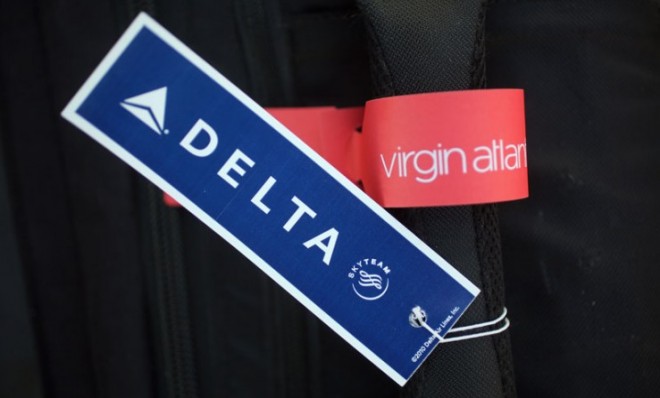Today in business: 5 things you need to know
Delta buys a big stake in Virgin Atlantic, the trade deficit widens, and more in our roundup of the business stories that are making news and driving opinion


A free daily email with the biggest news stories of the day – and the best features from TheWeek.com
You are now subscribed
Your newsletter sign-up was successful
1. DELTA BUYS STAKE IN VIRGIN ATLANTIC
Delta Air Lines said Tuesday that it was buying Singapore Airlines' 49 percent in Virgin Atlantic for $360 million in a deal that is expected to boost its share of the lucrative New York to London route. Virgin founder Sir Richard Branson will hold onto the remaining 51 percent of his company and retain control. The companies plan to launch a trans-Atlantic joint venture that, if approved by regulators in the U.S. and Europe, will give Delta access to hard-to-get landing slots at London's Heathrow airport, a hub for coveted corporate travelers. The airlines will continue to fly under their old names, but share revenue from their trans-Atlantic flights. Singapore Airlines bought its stake in Virgin 12 years ago for a far heftier price, but the investment proved disappointing. [Reuters]
………………………………………………………………………………
The Week
Escape your echo chamber. Get the facts behind the news, plus analysis from multiple perspectives.

Sign up for The Week's Free Newsletters
From our morning news briefing to a weekly Good News Newsletter, get the best of The Week delivered directly to your inbox.
From our morning news briefing to a weekly Good News Newsletter, get the best of The Week delivered directly to your inbox.
2. EXXON: AMERICA WILL BE NET EXPORTER OF OIL
Exxon Mobil Corp. is forecasting that North America will become a net exporter of energy by 2025, according to a report on energy trends the company is releasing Tuesday. The federal government recently made a similar forecast. A main reason for the shift is a surge in oil and gas production thanks to new technologies, such as hydraulic fracturing or "fracking," and horizontal drilling. U.S. oil production has hit a 15-year high and is still climbing, and natural-gas production is expected to exceed domestic demand by 2020. Coal use, however, will experience a 33-percent drop from 2010 figures to 2025, as coal power plants are replaced with more efficient ones fueled by natural gas. [Wall Street Journal]
………………………………………………………………………………
3. TRADE DEFICIT WIDENS
A free daily email with the biggest news stories of the day – and the best features from TheWeek.com
American exports suffered their biggest monthly decline in nearly four years in October, increasing the trade gap by 4.9 percent to $42 billion, according to the Commerce Department. Exports have been one of the main sources of support for the U.S. economy since the Great Recession. The new figures suggest that the long-term demand for American goods and services may be softening, which could slow U.S. economic growth over the rest of the final quarter of 2012. [Reuters]
………………………………………………………………………………
4. KIDS' APPS COLLECT PERSONAL DATA
Many mobile applications designed for children collect personal information — including location data and phone numbers — without the permission of the young users' parents, the Federal Trade Commission reported on Monday. The FTC is launching investigations into whether app companies are violating the Children's Online Privacy Protection Act or the Federal Trade Commission Act, and urging gatekeepers such as Google and Apple to help police the industry. "While we think most companies have the best intentions when it comes protecting kids' privacy," FTC chairman Jon Leibowitz said, "we haven't seen any progress when it comes to making sure parents have the information they need to make informed choices about apps for their kids." [Guardian]
………………………………………………………………………………
5. GOVERNMENT SELLS OFF ITS LAST AIG SHARES
The Treasury Department hauled in $7.6 billion in its final auction of AIG shares, four years after the federal government's controversial $182 billion bailout of the troubled insurance giant. The U.S. took control of AIG in an effort to contain the damage from its near collapse — the company insured 100,000 municipalities, retirement plans, and companies, and had close ties with major banks. The federal government, which once owned as much as 92 percent of AIG, has gradually sold off its stake, and the sixth and final sale pushed the U.S. profit from the rescue to $22.7 billion, according to the Treasury Department. AIG has sold off assets and scaled back on the mortgage-related bets that nearly destroyed the firm. [Bloomberg]
Harold Maass is a contributing editor at The Week. He has been writing for The Week since the 2001 debut of the U.S. print edition and served as editor of TheWeek.com when it launched in 2008. Harold started his career as a newspaper reporter in South Florida and Haiti. He has previously worked for a variety of news outlets, including The Miami Herald, ABC News and Fox News, and for several years wrote a daily roundup of financial news for The Week and Yahoo Finance.
-
 Why are election experts taking Trump’s midterm threats seriously?
Why are election experts taking Trump’s midterm threats seriously?IN THE SPOTLIGHT As the president muses about polling place deployments and a centralized electoral system aimed at one-party control, lawmakers are taking this administration at its word
-
 ‘Restaurateurs have become millionaires’
‘Restaurateurs have become millionaires’Instant Opinion Opinion, comment and editorials of the day
-
 Earth is rapidly approaching a ‘hothouse’ trajectory of warming
Earth is rapidly approaching a ‘hothouse’ trajectory of warmingThe explainer It may become impossible to fix
